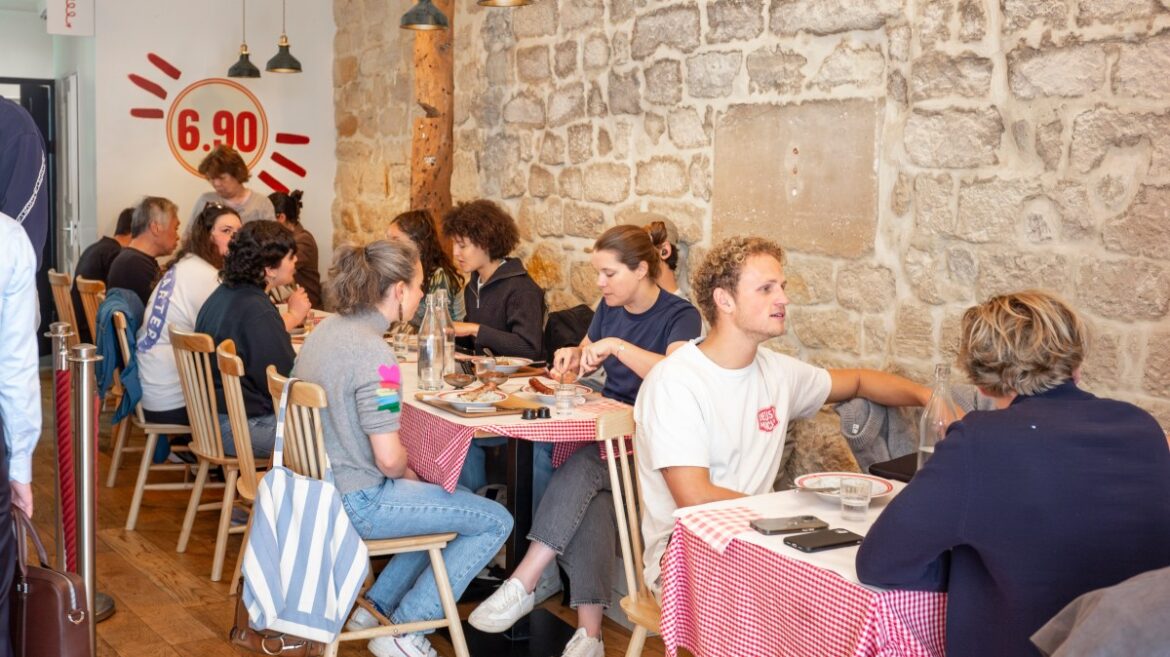The 6.90 may not be the most sophisticated restaurant in Paris but it claims to be the cheapest, and the argument has proved powerful among the city’s dwellers.
On Friday, dozens queued up for one of two main courses on offer, sausage and mashed potatoes, or vegetable lasagne, which both cost €6.90 — hence the name.
Matteo Balavoine, the 23-year-old joint owner, said it had been like that since the establishment opened in March. “It’s been a real success,” he said. “We’ve been serving 200 meals a day, and sometimes 300.”
The 6.90 is one of a small but growing number of restaurants in France serving cheap meals in response to the cost of living crisis. They are the subject of intense debate.
Proponents say the so-called “anti-crisis menus” are luring back diners who had stopped eating out after inflation began to rise a couple of years ago. Detractors, on the other hand, say they are dragging down prices, undermining profits and threatening the entire profession.
Although France is renowned for its inexpensive restaurants – at least compared with the UK — the average cost of a meal out rose by about 23 per cent between 2022 and 2024. In response, four out of ten people told an Ipsos poll last year that they went to restaurants less often than in 2019.

Matteo Balavoine, the 23-year-old joint owner: “We’ve been serving 200 meals a day, and sometimes 300”
CHLOE SHARROCK FOR THE TIMES

CHLOE SHARROCK FOR THE TIMES
Chefs found themselves staring at deserted tables. Take, for instance, the Bellevue near Limoges in central France, which was charging an average of €17 for a three-course meal but attracting just seven diners a day after being purchased by Laurent Berger, a businessman, in 2022. “My accountant said: ‘You are a nice man but you are going to go bust’,” Berger, 55, said.
He responded by dividing the Bellevue into what he calls a first-class dining room, where meals can cost up €59 a head, and a second-class one, which serves three courses, with a glass of wine and a coffee included, for €10, although only on weekday lunchtimes.
Second-class eating has turned out to be a triumph. “We are serving 70 or 100 meals a day now,” he said.
Berger said he used only fresh ingredients, but managed to keep costs down by limiting the range of dishes available on his menu and negotiating with suppliers.
On Thursday, for instance, there was salad for starters followed by black pudding with mashed potatoes and panna cotta for dessert. “And if you don’t like black pudding, well then that’s hard luck,” he said.

CHLOE SHARROCK FOR THE TIMES
In Paris, Balavoine, who is still a student at a Paris business school, is basing the 6.90 on much the same concept. With only two main courses and one dessert — chocolate mousse, for €2.90 — on the menu, he and his business partner are able to negotiate with suppliers over the price of their ingredients, which they insist are all fresh.
The restaurant has further cut costs by eliminating waiters. Customers pay and pick up a tray with their meal on it at the till when they arrive and are also expected to clear the table themselves.
The formula is an eye-opener for those accustomed to lofty Parisian dining, but has gone down well among people who dislike fast food but cannot afford restaurants such as the Tigermilk, a Mexican eatery down the road, where spare ribs are on the menu for €17 and a chicken burger for €14.50.
“It’s quick, it’s good and it fills you up,” said Lino Galdin, 26, a consultant, who was tucking into his sausage and mashed potatoes at a wooden table covered in a red and white checked cloth at the 6.90 with his colleague Paulina Flores, 26.
They had been on a training course in Paris all week, trying out local restaurants, but finding most beyond their means. “I haven’t got very much money and eating out in Paris is too expensive,” said Galdin, whilst Flores lamented having paid more than €20 for lunch the previous day.
• Is French food dead? Oui, top chefs think so
Balavoine opened the restaurant for a three-month trial period that finishes next week. Given the success, he plans to open on a permanent basis after the summer holidays.
However, Thierry Marx, the chairman of the Umih, the hotel and restaurant owners’ trade body, cautioned against the spread of low-cost meals. “You mustn’t mix up turnover and profits,” he said. “It’s true that it’s reassuring to see diners in the restaurant but if there’s nothing left at the end of the day… the fixed costs are going to drag you down.”
Bernard Boutboul, the chairman of Gira, a food consultancy, agreed, describing the “anti-crisis” menus as “very dangerous”. He said diners might become accustomed to paying low prices and refuse to pay more, driving many restaurants out of business.
Balavoine said each meal he served at the 6.90 cost 35 per cent more than the price he paid for the ingredients.
But he conceded that once other costs were included, he would need to open “three of four [similar] restaurants” to make money.

